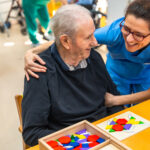Dementia has many different symptoms that occurs due to a variety of different diseases. Some of these symptoms include impairments in communication, memory and thought.
What are the symptoms of dementia?
If you or a loved one is experiencing problems with memory, it doesn’t necessarily mean that it is dementia. Generally, you’ll need to have at least two types of impairments that intefere with daily life to receive a diagnosis.
For example, as well as memory problems, you may also experience impairments in addition to difficulty remembering, the person may also experience impairments in:
- Communication
- Maintaining focus
- The ability to reason
- Difficulty with language
Below we list the 10 early signs of dementia to look out for:
- You may notice subtle changes with short-term memory
Having trouble with memory can be an early sign of dementia. These changes are usually subtle and can start with by affecting short-term memory. For example, you or a loved one may be abe to recall a memory for many years ago but are unable to remmeber what was had for breakfast.
You or a loved one may also forget why you entered a room, or what you were supposed to do for that day or even where you left an item. - You may have difficulty finding the right words
Another easrly sign of dementia is struggling with communicating your thoughts. You may find difficulty in explaining soming or finding the rights words to express yourself.
Often, having a conversation can be difficult, and it may also take longer to conclude. - You may notice changes in mood
Changes in mood is common with dementia. If you have dementia, you many not recognise these changes yourself, but you may notice these changes in someone else. Depression is also typical of early dementia.
Personality changes may also occur alongside changes in mood. For example, you may notice an individual who was once very shy may not be outgoing as the conditin itself can affect judgement. - You may experience confusion
During the early stages of dementia, you can often become confused. This can occur when memory, thinking or judgement is difficult and confusion may arise when you are unable to communicate the right words or remember familiar faces. You may also forget where you placed an item, or what you were planning to do for the day. - You may experience difficulty completing normal tasks
If you notice a subtly shift in the ability to complete tasks that you or a loved on were once capable of completing, this may indicate a symptom of early dementia.
You may also notice that there is difficulty with learning new things or following new routines. - You may notice signs of apathy
Apathy is also quite common in the early stages of dementia. You may notice a loss of interest in hobbies and/or activites that were once previously enjoyed. You may also notice that there is less of a desie to spend time with friends and family and can often appear to be emotionally flat. - You may have difficulty following storylines
Difficulty following storylines may in the early stages of dementia. You may find that you or a loved one often forgets the meanings of words they hear or that you struggle to follow conversations or TV programs. - You may find that you are being more repetitive
Repetition is common in dementia due to the changes in memory, memory loss and general changes with behaviour. For example, you may repeat daily tasks or begin to collect items obsessively.
You may also repeat the same questions in a conversation after they have been answered. - You may struggle to adapt to change
The early stages of dementia can cause you to experience fear. This is because you may be unable to remember familiar faces or follow the conversation. You may also forget why you went to the shop or find yourself getting lost on the way home.
As a result, you may crave routine and can find yourself being reluctant to try new experiences. Difficulty adapting to change is also a typical sign of early dementia. - You may have a failing sense of direction
Spatial orientation and the sense of direction can start to deteriorate with the onset of dementia. This can result in not recognising familiar places or locations and forgetting the directions of regularly used routes. You may also notice that following a series of directions or step-by-step instructions is more difficult.
When should you see a doctor?
It’s important to note that memory problems don’t automatically point to dementia as these are normal parts of ageing. They can also occur due to factors such as fatigue and stress. However, you shouldn’t ignore the symptoms.
If you or your loved one is experiencing several of the signs we have listed, and are not improving, we recommend that you should speak to a doctor.
Your doctor can refer you to a neurologist who will examine you or your loved one’s physical and mental health to determine whether the symptoms result from dementia, or another cognitive problem.
A neurologist may order:
- A series of memory and mental tests
- A neurological exam
- Blood tests
- Brain imaging tests
Dementia is more common in people over the age of 65, but it can also affect younger people. Early-onset of the dementia can begin in the 30s to 50s.
Early diagnosis and treatment can help to slow the progression of the disease and maintain mental function. Treatments may include medications, cognitive training, and therapy.
If you or your loved one is experiencing signs and symptoms of dementia, you can contact us or book an appointment with one of our world renowned neurologists today.





